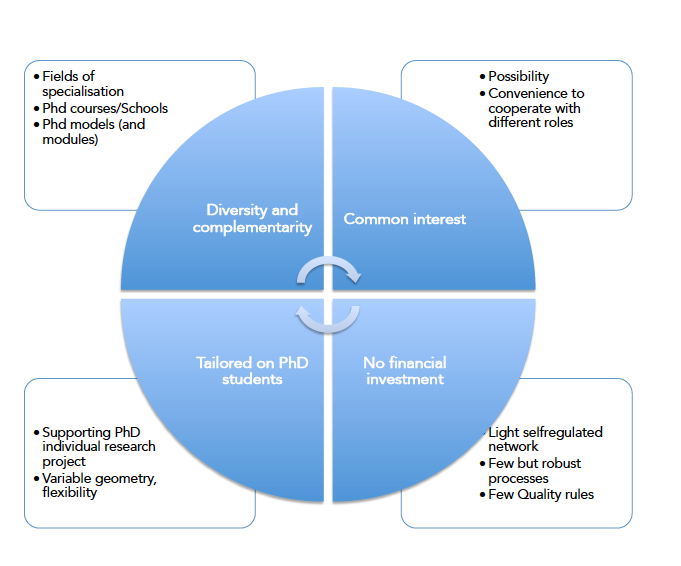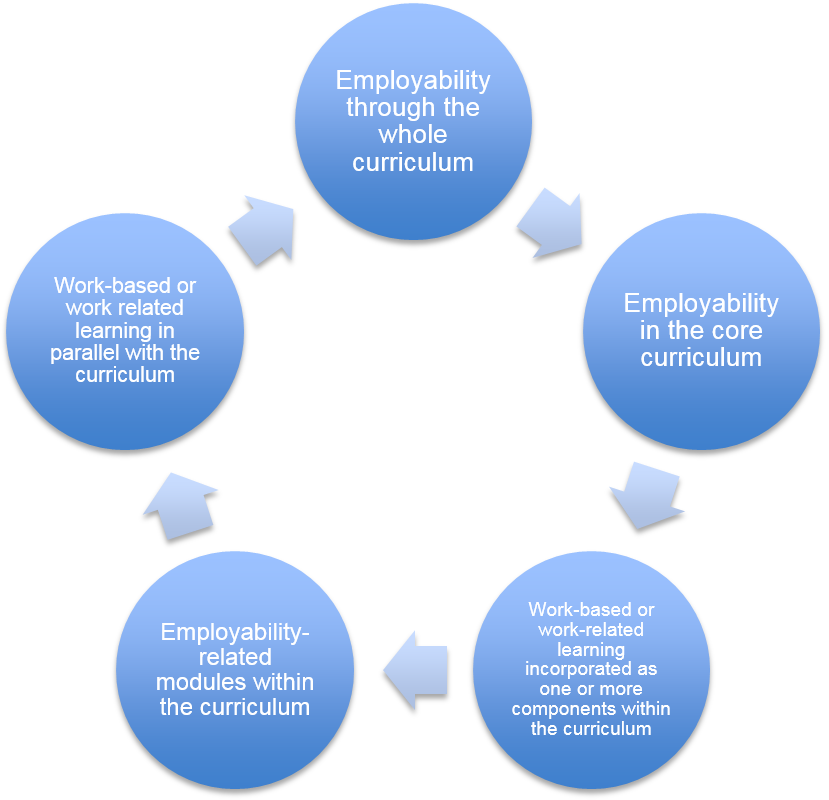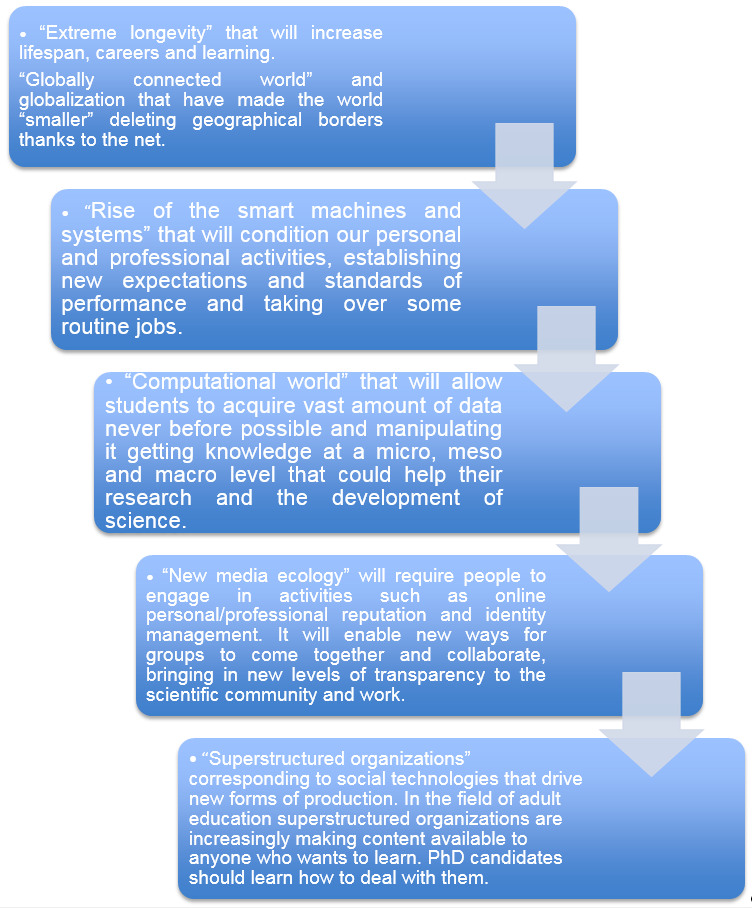Doctoral studies were formally introduced in the Bologna Process as the third cycle of education and as the way to building up the European knowledge society in a globalized economy. In this sense PhD courses are able to link the political goals of increasing the quality of postgraduate programs, meet the needs of a wider employment market, and combine tradition and innovation.
On 19th September 2003, Ministers responsible for Higher Education fixed the goals for the development of a coherent and cohesive European Higher Education Area by 2010 and declared that:
Conscious of the need to promote closer links between the EHEA[1] and the ERA[2] in a Europe of Knowledge, and of the importance of research as an integral part of higher education across Europe, Ministers consider it necessary to go beyond the present focus on two main cycles of higher education to include the doctoral level as the third cycle in the Bologna Process.
Since then the third cycle of higher education has become an increasing priority.
- Doctoral level qualifications need to be fully aligned with the EHEA overarching framework for qualifications using the outcomes-based approach.
- The core component of doctoral training is the advancement of knowledge through original research.
- Doctoral programme must have a clear structure and need a “transparent supervision and assessment.
- The normal workload of the third cycle in most countries corresponds to 3-4 years full time.
- Doctoral programmes must “promote interdisciplinary training and the development of transferable skills”, in order to “meet the needs of the wider employment market”.
- The number of doctoral candidates must increase and many of them should be encouraged to take up “research careers within the EHEA”.
- Participants in third cycle programmes are considered both students and early stage researchers[3].
The connection between Doctorate, higher education and adult learning is very important.
Europe missed the Lisbon goals of achieving a 12,5% rate of adult participation in lifelong learning by 2010. Adult participation stopped at 9,1% and afterwards stagnated. Considering the relation between the rate of participation in higher education of young people and their parents’ education level, we can understand that “The odds that a 20-34 year-old will attend higher education are low if his or her parents have not completed upper secondary education. On average across OECD countries, young people from families with low levels of education are less than one-half (odds of 0,44) as likely to be in higher education, compared to the proportion of such families in the population[4]”. The adult learning and continuing education policies should focus on the creation of pathways that help the professional growth and the acquisition and updating of skills. The higher training demand and propensity to join adult and continuing education comes from people in a non-disadvantaged condition. As Eurostat demonstrates adults with high levels of education represent the group that participate most likely to lifelong learning since the highest qualified workers have the highest obsolescent skills[5] and the most exposed to depreciation due to ageing[6]. Moreover, considering the changing nature of job market that seeks more highly qualified, highly skilled persons than in the past, the doctorate should attract both young graduate as well workers who want to increase their competencies and raise their productive potential thanks to the possess of specific skills.
- The Field: Adult Education Studies (with an International added value)
- The Methodology of Research: Evidence Based Approach
- The Curriculum structure (3 years): Process, Organization, Contents

-
The Model is based on 3 years Ph.D. Course
| Year | Main processes | Cooperation | How |
|---|---|---|---|
| 1 | Definition of Research Topic and Methodology | Offering Tutors, joint PhD Research projects, Teaching Modules or seminars | Launch of requests for cooperation, institutional agreements |
| 2 | Research Implementation | Tutoring and organisational support | Individual and Field support. Long Mobility |
| 3 | Research results analysis, communication and follow up | Evaluation and joint venture, spin-off, … | Common projects |
1) Core Curriculum Timing
| When | Which | Who | What |
|---|---|---|---|
| 1st Year | Selection of the topic | Selection of the tutor/co-tutor and University | Recognition of the sources and strategy of the research |
| 2nd Year | Definition of the methodology of the research | Individual student/the exterts/the professors in co-tutoring/mobility | Methods and developments of the research |
| 3rd Year | Writing the paper and the research results | Individual student | Competences for the communication of the research results |
1st Year of Ph.D. Course
| Months | Process | Organisation Functions/Institutions | Core Curriculum |
|---|---|---|---|
| 1-2 | Definition: Contents of the individual PhD research project | All the University partners with PhD students | Selection of the content/topic selection |
| 3-6 | Definition of the project | State of the art/Recognitionof the partner Universities/Co-tutoring | Guidance and education at local level |
| 4-6 | Scouting of experts | Experts/Professors/Institutions/Firms | Fine tuning of the research field in cooperation with partners |
| 7-8 | Formulate of the Project (first draft) | Students at local level (method) and in contact with partners (ideas) | Research project design |
| 8-9 | Institutional agreement | All Universities involved in partnership | |
| 9 | Student Agreement | With | Research planning |
| 9-12 | Implementation of the project | Individual/Group mobility | Guidance and education at local/international level |
2nd Year of Ph.D. Course
| Months | Process | Organisation Functions/Institution | Core Curriculum |
|---|---|---|---|
| 13-14 | Interim evaluation of the project | The professors in co-tutoring | Methodology |
| 15-23 | Development of the research | Individual Students Experts |
Contents and Methodology |
| 23-24 | Interim evaluation of the research project | Experts/Professors/Institutions/Firms | Contents and Methodology |
3rd Year of Ph.D. Course
| Months | Process | Organisation Functions/Institution |
Core Curriculum |
|---|---|---|---|
| 25 | Results systematisation | Professors in co-tutoring | Results systematisation |
| 25-34 | Writing the research results | Individual students/Experts | Results communications |
| 33-36 | Fuinal evaluation of the research and follow-up | Experts/Professors/Institutions/Firms | Evaluation, forecasting, marketing, fund raising |
2) List of competencies in the ESRALE Ph.D. Courses[7]
Research Skills and Techniques – to be able to demonstrate:
- The ability to recognise and validate problems.
- Original, independent and critical thinking, and the ability to develop theoretical concepts.
- A knowledge of recent advances within one’s field and in related areas.
- An understanding of relevant research methodologies and techniques and their appropriate application within one’s research field.
- The ability to critically analyse and evaluate one’s findings and those of others.
- An ability to summarise, document, report and reflect on progress.
Research Environment – to be able to:
- Show a broad understanding of the context, at the national and international level, in which research takes place.
- Demonstrate awareness of issues relating to the rights of other researchers, of research subjects, and of others who may be affected by the research, e.g. confidentiality, ethical issues, attribution, copyright, malpractice, ownership of data and the requirements of the Data Protection Act.
- Demonstrate appreciation of standards of good research practice in their institution
- and/or discipline.
- Understand relevant health and safety issues and demonstrate responsible working practices.
- Understand the processes for funding and evaluation of research.
- Justify the principles and experimental techniques used in one’s own research.
- Understand the process of academic or commercial exploitation of research results
Research Management – to be able to:
- Apply effective project management through the setting of research goals, intermediate milestones and prioritisation of activities.
- Design and execute systems for the acquisition and collation of information through the effective use of appropriate resources and equipment.
- Identify and access appropriate bibliographical resources, archives, and other sources of relevant information.
- Use information technology appropriately for database management, recording and presenting information.
Personal Effectiveness – to be able to:
- Demonstrate a willingness and ability to learn and acquire knowledge.
- Be creative, innovative and original in one’s approach to research.
- Demonstrate flexibility and open-mindedness.
- Demonstrate self-awareness and the ability to identify own training needs.
- Demonstrate self-discipline, motivation, and thoroughness.
- Recognise boundaries and draw upon/use sources of support as appropriate.
- Show initiative, work independently and be self-reliant
Communication Skills – to be able to:
- Write clearly and in a style appropriate to purpose, e.g. progress reports, published documents, thesis.
- Construct coherent arguments and articulate ideas clearly to a range of audiences, formally and informally through a variety of techniques.
- Constructively defend research outcomes at seminars and viva examination.
- Contribute to promoting the public understanding of one’s research field.
- Effectively support the learning of others when involved in teaching, mentoring or demonstrating activities
Networking and Teamworking – to be able to:
- Develop and maintain co-operative networks and working relationships with supervisors, colleagues and peers, within the institution and the wider research community.
- Understand one’s behaviours and impact on others when working in and contributing to the success of formal and informal teams.
- Listen, give and receive feedback and respond perceptively to others.
Career Management – to be able to:
- Appreciate the need for and show commitment to continued professional development.
- Take ownership for and manage one’s career progression, set realistic and achievable career goals, and identify and develop ways to improve employability.
- Demonstrate an insight into the transferable nature of research skills to other work environments and the range of career opportunities within and outside academia.
- Present one’s skills, personal attributes and experiences through effective CVs, applications and interviews.
3) Labour Market Oriented Esrale Ph.D. Course
The PhD certificate does not necessary guarantee employment because many elements influence employability: e.g. study area economical conjuncture, researcher characteristics, luck and persistence, technical and soft skills, the desired job, maturity and autonomy.
Moreover, some firms can value positively autonomous, independently minded persons, while others can value the lack of interpersonal skills and the awareness of these skills.
There is a variety of ways in which employability can be developed though curricula:

In our perspective we should consider that a PhD course in Adult Education could help the employment of a variety of professionals in the learning and educational field, such as trainers, program planners, curriculum designers, career counsellors, HR managers, researchers in the public and private sector.
Since predictions of the future landscape of work and professional figures are difficult, PhD students should focus on their future soft skills and
the drivers that as “big disruptive shifts” can influence the future landscape of work. These drivers are:

As a consequence, students cannot avoid the internationalisation of the research and integrate the global and the local level[8].
This type of organization is supported by many Agreements, Erasmus Agreement and Cultural Agreements among the Universities of the Network.
- Technische Universität Kaiserslautern (DE)
- DIE (Deutsches Institut Für Erwachsenenbildung) (DE)
- University of West Timisoara (RO)
- University of Pecs (HU)
- Vytautas Magnus University (LT)
- Dublin City University (IE)
- Università degli Studi di Firenze (IT)
- Marsyk University of Brno (CZ)
- University of Barcelona (ES)
- Inholland University of applied Sciences (NL)
- University of Belgrade (RS)
- Universität Würzburg (DE)
[1] EHEA – European Higher Education Area
[2] ERA – European Research Area
[3] Communiqué of the Conference of European Ministers Responsible for Higher Education, The European Higher Education Area – Achieving the Goals, Bergen, 19-20 May 2005. Some elements of the Bergen Communiquè were confirmed in the Communiqué of the Conference of European Ministers Responsible for Higher Education, Leuven and Louvain-la-Neuve, 28-29 April 2009, especially with reference to internationalization, quality, inter-disciplinary and inter-sectoral programmes, career path.
[4] OECD, Education at a glance 2012: OECD Indicators, OECD Publishing 2012, p. 104
[5]Federighi P., Adult and continuing education in Europe, European Commission, 2014, pp. 12-13, http://ec.europa.eu/research/social-sciences/pdf/kina25943enc.pdf, (01/15)
[6] Cedefop, Skill mismatch in Europe, Briefing note, June 2010, www.cedefop.europa.eu/files/9023_en.pdf (01/15)
[7] See: The Joint Statement on Skills Training Requirements for Research Students, JSS, produced by the UK Grad programme and the Higher Education sector in 2001, set out the competencies that in their opinion doctoral students and researchers should develop during their training.
[8] Davies A., Fidler D., Gorbis M., Future Work Skills 2020 , Institute for the Future, University of Phoenix Research Institute, 2011, http://www.urv.cat/media/upload/arxius/CAE/oprofessional/future_work_skills_2020.pdf (01/16)
